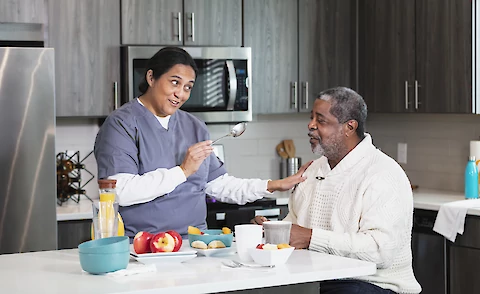
March ushers in Nutrition Month. It’s a time to focus on making informed food choices and developing sound eating habits. This is particularly crucial when caring for our senior loved ones whose nutritional needs significantly impact their overall health and well-being. As caregivers, our role stretches beyond providing daily care to ensuring they maintain healthy eating habits.
The Nutritional Needs of Seniors
Our bodies undergo various changes that affect our nutritional needs as we age. Seniors often require fewer calories but more of certain nutrients like calcium and vitamins B and D. A balanced diet rich in fruits, vegetables, lean proteins, whole grains, and low-fat dairy can help meet these needs. Hydration is another vital need in senior nutrition, as older adults are more susceptible to dehydration. Caregivers must encourage them to drink water and other healthy fluids regularly.
Overcoming Resistance to Dietary Changes
Resistance to dietary changes among seniors is not uncommon. It could stem from a desire to maintain a routine, a fear of giving up favorite foods, or even the misconception that healthy foods lack taste.
Empathy and patience are vital in handling this resistance. Try introducing changes gradually. Consider incorporating healthier versions of their favorite meals. Make the dining experience enjoyable by focusing on the aesthetics of meals. Creating a pleasant dining environment can also help.
Practical Nutrition Tips for Caregivers
Meal planning and preparation can be less challenging with some practical strategies. Create nutritionally balanced meals while considering the senior’s unique dietary needs. Tailor meals to their preferences and health requirements. If they have a sweet tooth, swap sugary snacks with fresh fruits.
Make meals visually appealing and easy to eat. Vegetables can help add color to different dishes while boosting their nutritional content. Seniors may struggle with complex meals, so keep things simple and palatable. Don’t forget about snacks. Keep a stash of nutritious snacks like nuts, yogurt, or sliced fruits they can nibble on during the day.
Ensure hydration by offering fluids throughout the day. Water, unsweetened juices, or even soups can contribute to their fluid intake. If they resist drinking water, try flavoring it with a splash of juice. Fruit slices can also add an enticing twist to plain water.
Importance of Regular Monitoring and Adjustments
Monitoring the eating habits and overall health of seniors is essential. Be alert for signs of poor nutrition, like sudden weight loss or frequent illnesses. If they show reluctance to certain foods, try to figure out why. It will help you adjust the meal plan appropriately. Maybe the food is too hard to chew, or they simply don't like the taste. These small changes can make a big difference.
If you're struggling to manage the nutritional needs of your senior loved one, don't hesitate to seek professional advice. Nutritionists and healthcare providers can offer valuable insights and suggestions tailored to your unique situation.
Get In-Home Care Support From Senior Helpers Des Plaines
As a carer, you play a pivotal role in ensuring your senior loved one's health and well-being through proper nutrition. If you’re struggling with meal prep and could use a helping hand in caring for your senior loved one, Senior Helpers Des Plaines can help. We provide professional in-home care in Chicago, Des Plaines, and Lake Forest, from companionship to personal care. Contact us today, and let's champion the cause of senior nutrition together.